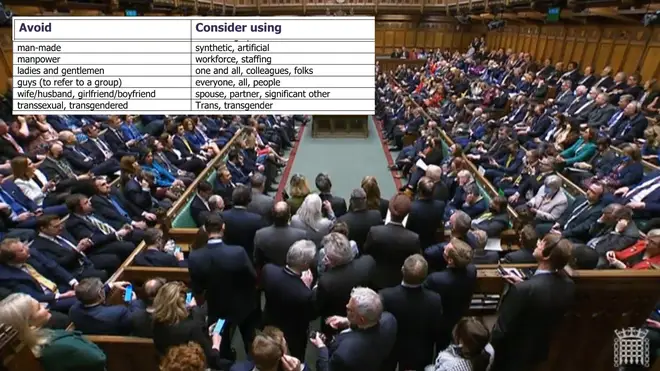
Nick Abbot 10pm - 1am
27 April 2022, 20:57

Staff members in the House of Commons have been instructed not to use "offensive terms" including "ladies and gentlemen".
A freedom of information request submitted by DemocracyUnlocked revealed new guidance on 'inclusive language" had been issued to around 2,000 employees at the House of Commons.
In new guidance, staff have been asked to avoid using gendered language in the workplace, replacing "ladies and gentlemen" with "one and all, colleagues or folks".
The phrase "man-power" has also been replaced with "workforce or staffing" and employees must not refer to groups of people as "guys".
Under the new drive for inclusivity staff have been instructed not to talk about wives, husbands, girlfriends or boyfriends whilst in the workplace, instead referring to them as a "spouse, partner or significant other".
Despite issuing a list of common words and phrases to avoid, the new Government advice states: "Don’t be too precious or too politically correct – being super-sensitive to the right and wrong language and depictions will stop you doing anything."

Author reacts to RCM climbdown from using 'trans-inclusive' language
Adding: "The language you use impacts others around you, if the words and phrases you use are offensive this may exclude certain groups of people based on assumptions; cause distress or embarrassment; reinforce derogatory labels or stereotypes and belittle certain groups of people.
"As humans we make mistakes and sometimes get things wrong. If you use the wrong language and someone raises it with you, press pause and listen carefully to what they say.
"Accept responsibility and don’t be defensive. Ask them if they could explain what you should say in future, or where you can find more information."
Read more: Trans author 'burns JK Rowling alive' in horror novel based on killing 'radical feminists'

Ex-Cop hits out at gender neutral uniforms
In addition to banning gender language staff will also be expected to be mindful of words used when talking about disabilities, age, race, class, sexuality and religion.
It comes after similar advice was given to members and staff in the House of Lords which Historian Andrew Roberts branded "sad and pathetic ultra-wokery" stating: "It is also hypocritical. Why isn't it renaming itself the House of Lords, Ladies and Self-identifying Transsexual Peers?"
The Government is not the only employer to encourage the crapping of gendered language with education professionals also being encouraged to drop the use of gendered language such as "Sir" and "Miss" and instead opt for gender neutral terms such as "teacher".
In a lecture organised by the National Education Union (NEU), Dr Elly Banes, chief executive of the Educate & Celebrate charity, said schools should aim to become more gender neutral - a model she said was "working very well" in a lot of schools.
Read more: Parents told son, 6, could be 'transphobic' after he was 'confused by boy wearing a dress'
Read more: Scotland to let people self-identify their sex in next census
Dr Barnes said teachers should be referred to as "teacher" or "headteacher", followed by their surname.
The advice was not just limited to teachers, with the charity executive also saying "head boy" should be replaced with "head pupil" and the word "parent" should be used instead of "mother".
Dr Barnes also said the gender question on school application forms should be "left open" and said uniforms should be gender-free, and teachers should ask students what their preferred pronouns are when they first meet.
She said the changes should be listed on a "code of conduct" at the school's reception that listed all characteristics protected under the Equalities Act - apart from sex - and said people should not be allowed on the premises if they did not agree with the code.